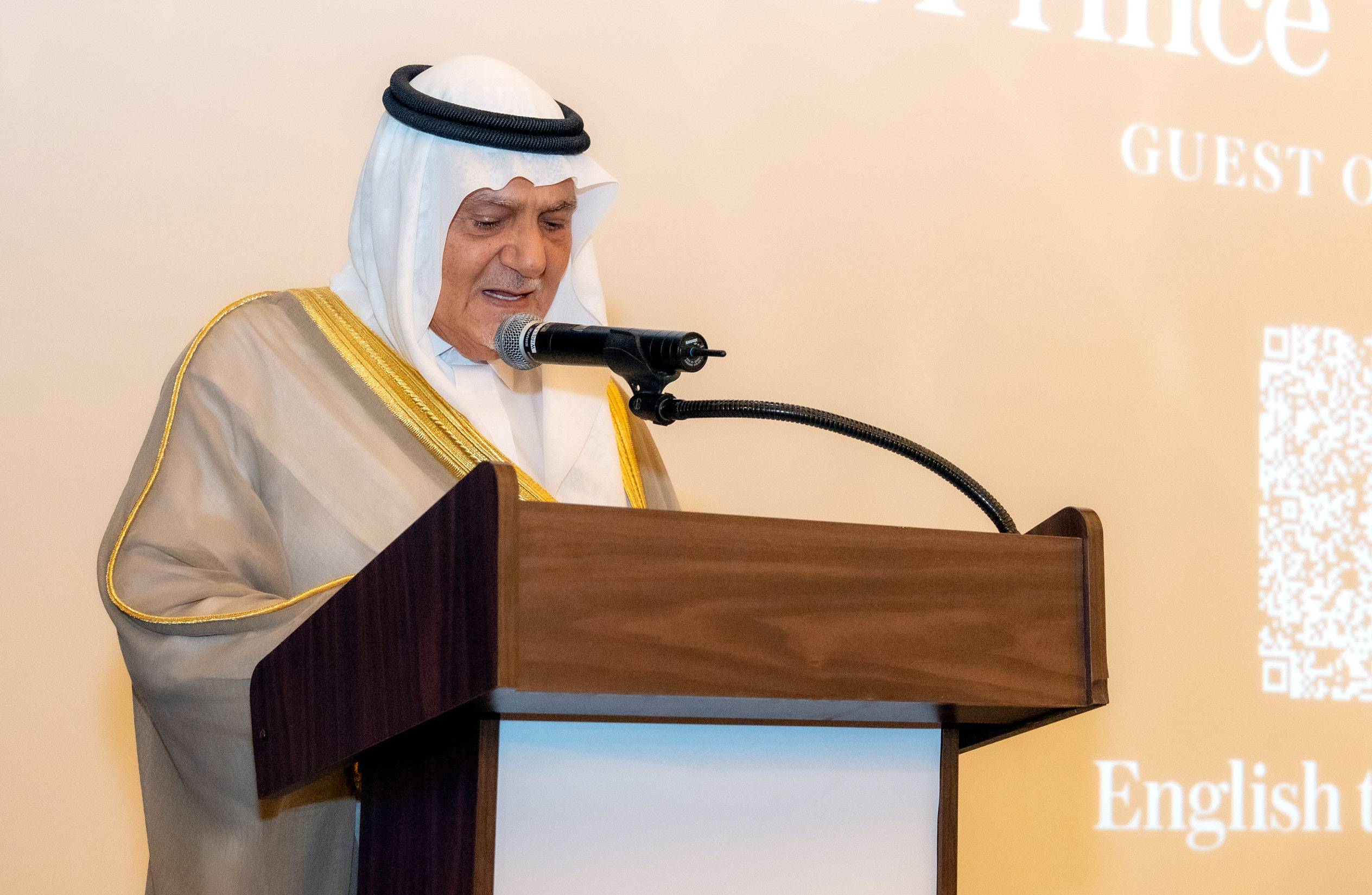HRH Prince Turki AlFaisal at the Arab News 50th anniversary celebration: The Gulf region is at the heart of regional and international challenges.
HRH Prince Turki AlFaisal, Chairman of the Board of Directors of the King Faisal Center for Research and Islamic Studies, delivered a speech during the celebration held by Arab News on its 50th anniversary on Saturday, September, 28, 2025 in Riyadh, attended by a distinguished group of diplomatic and media figures.
Prince Turki AlFaisal began his speech by expressing gratitude to Arab News Editor-in-Chief Mr. Faisal Abbas, and to the Ambassador of Djibouti and Dean of the Diplomatic Corps accredited to the Kingdom, Ambassador Diaa Al-Din Bamkhurma, for the kind invitation. He also extended his congratulations to the newspaper's staff, affirming that for fifty years it has expressed the Kingdom’s moderate voice and painted its bright image before the English-speaking world. The prince recalled the beginnings of the idea to launch it, noting that the idea emerged after the Ramadan War of 1973 and the oil embargo on the United States, when the Kingdom faced a Western media campaign. He explained that the late Hisham Hafiz and his brother Mohammed Hafiz presented the idea to Sheikh Kamal Adham, advisor to King Faisal and director of the external Liaison office, and that he participated with Hisham in preparing the proposal and submitting it to King Faisal, who realized its importance and approved it before his martyrdom in 1975. He added that veteran journalist Jihad Al-Khazen and the first editor-in-chief Ahmed Mohammed Mahmoud played a prominent role in guiding the nascent newspaper, before the media scene witnessed the birth of the newspaper "Asharq Al-Awsat" in 1978.
In his speech, the prince moved on to address the current situation, pointing to the recent Israeli attack on the State of Qatar during its mediation with the Hamas movement, which he described as hostile and treacherous. He said this attack constitutes a warning bell for all Gulf countries and raises questions about the credibility and reliability of alliances, emphasizing the need to reconsider joint security strategies and not to allow Israel to act at will in confronting it. He confirmed that the Gulf region, due to its strategic location and resources, has remained vulnerable to regional and international competition. Nevertheless, the Gulf Cooperation Council countries have managed to maintain their security and stability through diplomacy and international alliances, overcoming major challenges such as the Iranian revolution, the Iran-Iraq war, the invasion of Kuwait, and the invasion of Iraq, as well as the repercussions of the Arab Israeli conflict. However, he pointed out that the ongoing wars today in Gaza, Lebanon, Syria, Yemen, and Sudan, in addition to the Iranian nuclear file, impose new challenges on the region.
Prince Turki AlFaisal emphasised that the GCC countries have set an example in political stability and development, thanks to the stability of their political systems and their adoption of wisdom and moderation in managing their relations, which has enabled them to direct their wealth towards improving living standards and protecting internal security. He considered that development visions and economic reforms, including the Kingdom's Vision 2030, are evidence of the region's ambitions to continue the path of prosperity, stressing that the success of these visions depends on a stable and secure regional environment. He touched on the current global transformations, where uncertainty prevails in the international economic system and international laws and norms are under constant threat, pointing out that the wars in Europe and the Middle East and the trade conflicts between the major powers are clear evidence of this. He said that the Middle East has been most affected by this situation, holding the United States largely responsible for its shift from being an impartial mediator after the 1973 war to a strong ally of Israel, and for handing Iraq over to Iran and sectarian forces after its invasion. He stressed that the double standards of the United States in dealing with the Israeli occupation and the massacres in Gaza undermine its credibility, calling on Washington to correct its mistakes if it wants to play the role of peacemaker.
Prince Turki AlFaisal emphasized that the Palestinian cause remains the most urgent issue and is the main source of threat to regional peace and security. He criticized the failure of the international community and the Security Council to stop the Israeli war on Gaza and the West Bank, considering the misuse of the veto power as reflecting international hypocrisy on regional issues. He pointed out that Arab countries welcomed the Madrid process in 1991, but Israel thwarted all initiatives, affirming that the continuation of the conflict threatens regional stability. The Hamas attack on October 7, 2023, was clear evidence of the international community's failure to resolve this just cause. He explained that the Kingdom has always supported international initiatives to resolve the issue and has had two pivotal initiatives: King Fahd's Peace Plan in 1981, and King Abdullah's Arab Peace Initiative in 2002, which were adopted by Arab countries and presented to the international community, but Israel ignored them. He concluded by affirming that the Kingdom still believes in the viability of the Arab Peace Initiative as the most just initiative and will continue to support any effort leading to a just solution accepted by the Palestinians, rejecting Western claims that recognizing the State of Palestine is a reward to Hamas, and affirming that the ongoing Israeli occupation is the real cause of the emergence of resistance.

